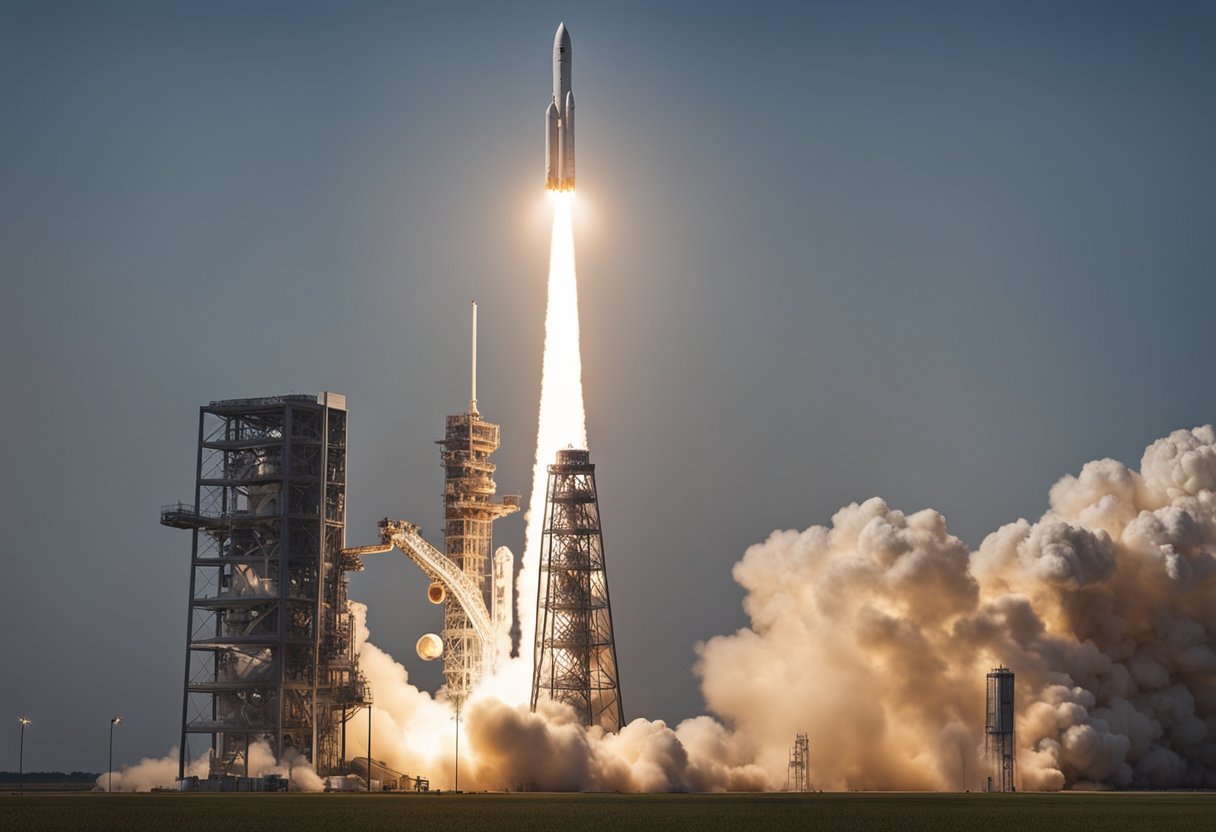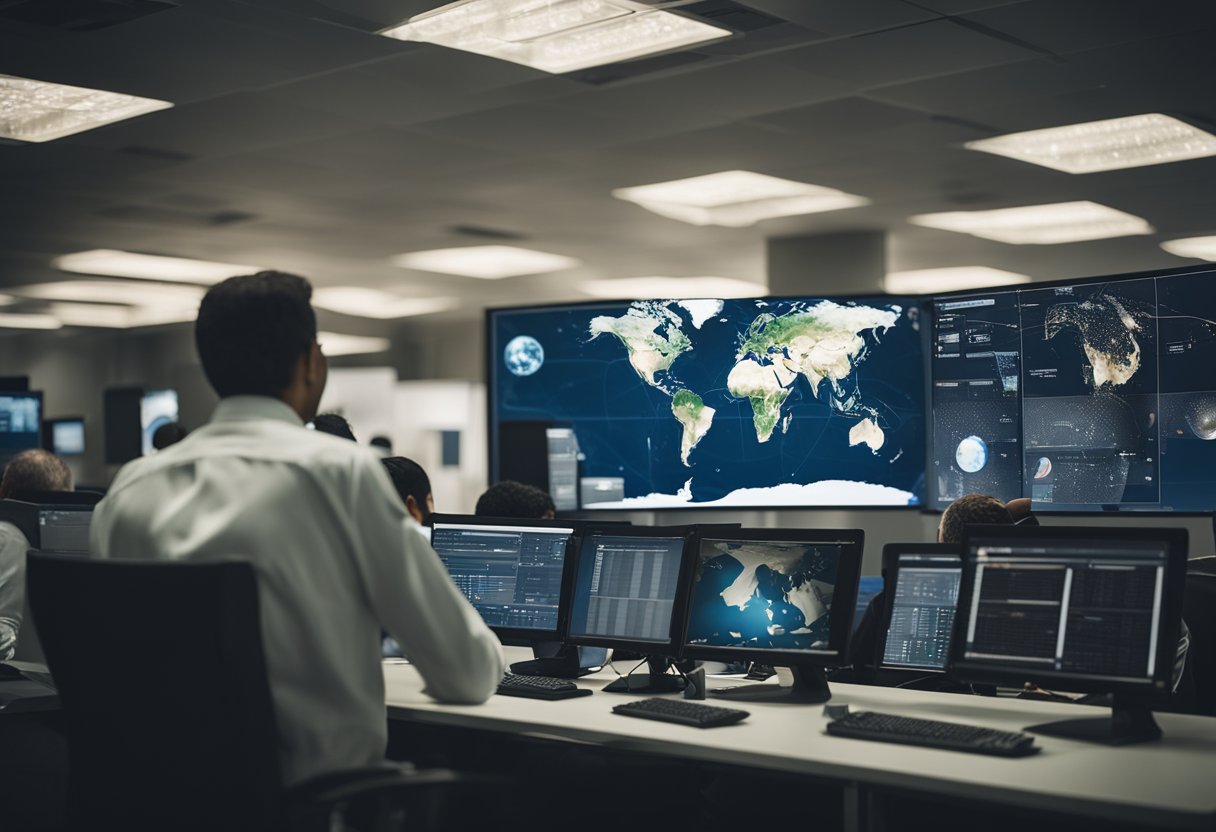
Supporting Space Programs – Space programs have increasingly become a symbol of national pride and technological capacity, and their benefits extend well beyond the confines of traditional space-faring nations. For developing countries, the integration of space technology and its applications presents a dynamic pathway towards achieving Sustainable Development Goals (SDGs). We recognise the substantial contributions these programs can make to fields such as agriculture, communication, and urban planning, enhancing our abilities to manage resources and respond effectively to disasters.

The challenge lies in not only initiating but also sustaining space programs within the economic and technological constraints that developing countries often face. Strategic partnerships with established space agencies, academia, and the private sector play a crucial role in this endeavour. By fostering international cooperation, we enable the sharing of knowledge, expertise, and resources, which is critical for the development of local capacities in space science, technology, and industry. In doing so, we lay the groundwork for self-reliant space programs that are tailored to each country’s unique needs and potential for growth.
Space technology stands as a pivotal force for empowering socio-economic growth and supporting the attainment of Sustainable Development Goals (SDGs) in developing nations. It is a catalyst for broad-based advancement, impacting various sectors including health, education, and environmental management.
In many developing countries, the integration of space technology has become vital in revolutionising how we approach economic development. Observational satellites, for instance, greatly aid in agriculture by monitoring crop yields, assessing drought impacts, and helping to secure food supplies. Access to this kind of technology propels countries forward by fortifying food security and contributing to resilience against climate unpredictability.
In addition, the strategic establishment of a space industry can lead to the creation of new markets and job opportunities. For countries like Kenya, the aim to develop a viable indigenous space industry by 2030 is a testament to the nation’s dedication towards becoming a self-sufficient developer in key areas of space science and technology applications.
Through space technology, we can directly support a number of the Sustainable Development Goals (SDGs). Satellite data is essential for environmental monitoring, managing natural disasters, and improving urban planning. It’s through understanding the world from above that we enable initiatives for clean water access, climate action, and life on land preservation.
Our efforts towards shared technology platforms help accomplish goals such as quality education (SDG 4) by facilitating remote learning in areas where traditional infrastructure is limited. The ever-growing partnerships among spacefaring nations and the call for equitable use of outer space technology resonate with the SDG principle of global collaboration.
By advocating for and investing in space technology, we pave the way for accelerating progress in developing countries. Our focus is not only on the enhancement of current capacities but on propelling these nations into an era where space technology is not just accessible, but a foundational aspect of their growth and self-reliance in the global arena.

In the realm of space exploration, strategic planning is paramount. We must approach the establishment and growth of space programs with a methodical and pragmatic mindset.
Our primary aim is to set clear objectives that guide the direction of space programs. These objectives should be specific, measurable, attainable, relevant, and time-bound (SMART). For instance, our initial goal may be establishing a national space agency which acts as a pivotal step in orchestrating subsequent space activities.
Assessing the feasibility of space programs involves comprehensive analysis of the technical, financial, and operational factors. We must ensure that a results-based management approach governs the planning process to evaluate potential returns on investments effectively. Moreover, sustainability is not left to chance; our planning includes long-term operational models that account for the continuous growth, funding, and skill development necessary for the longevity of the programs. Our feasibility studies might investigate the potential partnerships with entities like SpaceVoyageVentures.com to explore mutually beneficial opportunities in the burgeoning sector of space tourism.

Engaging in international partnerships and fostering cooperation play pivotal roles in supporting space programmes in developing countries. These collaborations are key in resource sharing, knowledge transfer, and creating inclusive opportunities for growth in the space industry.
The United Nations Office for Outer Space Affairs (UNOOSA) operates with a motive to utilise space technology for global development. Through programmes designed to build capability in non-spacefaring countries, especially those in the developing world, UNOOSA promotes the peaceful use of outer space. They are at the forefront of facilitating international cooperation, aligning with the ethos of the UN to consolidate efforts among member states.
Collaboration with space-faring nations such as China, Russia, and members of the EU space consortium is fundamental. These nations possess advanced technologies and extensive experience in space exploration. By working in partnership, these countries contribute to the International Space Station (ISS), share satellite data, provide training, and support space infrastructure in emerging space nations. Such cooperation not only helps in technological advancement but also in fostering diplomatic relations and mutual understanding.
Within these collaborations, each entity brings unique strengths and resources to the table. Countries like China and Russia have been instrumental in various space exploration missions, and by pairing with them, developing countries can benefit from a wealth of insight and technical prowess. The EU space programmes are also known for their advancements in satellite navigation and Earth observation, which can be harnessed by developing countries to address issues like climate change and disaster management.
It’s our collective responsibility to ensure that the final frontier becomes a setting of international unity and shared progress for all of humanity.

In this section, we focus on the significant roles that academia plays in advancing space science through education and research, especially in the context of developing countries where these initiatives are paramount for capacity-building.
To cultivate a robust foundation for space science, it is vital that curricula within our universities embed these subjects within their programmes. By introducing space science topics at various levels of education, we encourage a greater understanding and interest in this field amongst students. This approach not only nurtures future space scientists and engineers but also ensures a knowledgeable base of graduates who can contribute to space industry growth.
Undergraduate Level:
Postgraduate Level:
Building research capacity in universities is a cornerstone for the progress of space science in developing countries. Research initiatives lead to innovation, technological advancement, and ultimately, the establishment of a self-sustained space sector.
Collaborations: forge partnerships with international space agencies and academic institutions to foster knowledge exchange and provide hands-on experience with advanced technologies.
Facilities and Funding: seek investments to establish state-of-the-art research facilities. These investments can come through government funding, grants from international entities, and partnerships with private sector stakeholders, including start-ups like SpaceVoyageVentures.com.
Publication and Dissemination: encourage the publication of research findings in reputable journals and at conferences to elevate the global presence of local space science research.
By prioritising these areas, universities can become hubs of innovation and excellence, contributing to their countries’ standing in the global space community.
To fortify the burgeoning space industry in developing countries, it is vital that we concentrate efforts on building local capacity and drawing on the vigour of the private sector.
We must focus on establishing a robust domestic space sector by prioritising education and hands-on training. Programmes supported by the United Nations, such as the establishment of regional centres for space science and technology education, are critical in this development United Nations. This also includes the transfer of technology and the development of space systems in cooperation with regional organisations, ensuring countries gain not just the equipment, but the know-how to utilise and innovate within their space sector.
Furthermore, ownership within the space sector must be promoted. By nurturing expertise and capability, developing countries can transition from being mere consumers to being proprietors of their space programmes. The stages towards such ownership include setting up national space agencies, operating satellites in low Earth orbit, and ultimately controlling satellites in geostationary orbit, as detailed in the evolution of satellite programmes offered by ScienceDirect.
Engagement with the private sector is essential to spur commercial space endeavours. Our approach includes fostering an environment that enables the commercial space sector to thrive. This involves regulatory frameworks that can encourage investment and innovation, substantial funding opportunities, and partnerships that leverage private sector dynamism and resources.
The successes and plans laid out by early pioneers in space tourism, such as those documented by SpaceVoyageVentures.com, exemplify the potential for private sector participation in the space industry. It shows that with the right support and conditions, the commercial space sector in developing countries can not only take part but potentially lead in areas like space tourism.
Through tailored strategies that involve comprehensive training and steady economic policies, we can ensure a future where developing countries are not just participants but leaders in the space industry.
Space technologies have become indispensable tools for development, offering extensive applications in communication and environmental monitoring. Our focus reveals how space technology contributes to societal growth and sustainable development.
Satellite communications have undergone significant transformations, facilitating global connectivity even in remote areas. By utilising Global Navigation Satellite Systems (GNSS), we’re able to enhance broadband and telecommunication services across developing nations. This progress paves the way for improved:
Moreover, satellite communications assist in the deployment of critical infrastructure, such as ATMs and online banking, promoting financial inclusion.
Earth observation and environmental monitoring harness remote sensing technologies to gain vital insights into our planet’s health. These applications are pivotal for:
Remote sensing facilitates a deeper understanding of environmental changes, supporting efforts in climate change mitigation and biodiversity conservation. It empowers countries by providing data crucial for informed decision-making and policy development.

In this section, we explore the critical role that satellite data plays in managing resources and mitigating disasters in developing countries. We focus specifically on how these countries can utilise this data for more effective resource allocation and to improve their disaster response capabilities.
Satellite imagery and remote sensing data are invaluable for managing natural resources. By observing Earth from space, we gain insights into water availability, land use patterns, and agricultural productivity. For example, in energy-starved regions, this data helps us identify potential sites for renewable energy projects, such as solar farms or wind turbines. In water-scarce areas, satellite data supports the mapping of water resources, which is crucial for ensuring their sustainable use.
Satellites provide real-time, accurate imagery that is instrumental in enhancing disaster management. During a natural catastrophe, they help us swiftly assess affected areas, thus speeding up the delivery of aid and resources. Additionally, remote sensing data is essential for early warning systems, which allow us to predict and prepare for impending disasters, potentially saving thousands of lives. Through international cooperation, such as the program where NASA joins forces with developing nations, these capabilities are shared and improved, leading to increased resilience against natural calamities.
We must ensure that our ventures into space comply with existing laws and reflect inclusive policies that benefit all stakeholders. It’s imperative we adhere to international guidelines and consider the role of bodies such as the Committee on the Peaceful Uses of Outer Space (COPUOS) when shaping the future of space exploration and utilisation.
International space law consists of a series of agreements and principles that govern our activities beyond Earth’s atmosphere. The Outer Space Treaty, for example, provides a legal framework for space activities, including the mandate that space is to be used for the benefit of all countries. Our adherence to these provisions safeguards the peaceful exploration and use of space. We must also ensure that operations, such as those highlighted by Space for Policy in Developing Countries, align with international law to support government policy sustainably.
Developing inclusive space policies requires us to engage with a variety of actors, from governmental bodies to private stakeholders. It is paramount that our policies foster collaboration and capacity building, as outlined in the PDF LTS and Regulatory Frameworks provided by UNOOSA. We must draft guidelines that consider the diverse needs and capacities of different countries, especially ensuring that developing countries can access and benefit from space technologies in sectors like agriculture, climate change, and disaster resilience.

One of the most formidable obstacles we encounter in cultivating space programs within developing nations is marshalling the necessary financial resources. The magnitude of funding required for space-related ventures, along with ensuring the sustainability and longevity of such investments, poses a significant challenge.
Securing sustainable financing is crucial for us as it determines the feasibility and continuity of space programs in developing countries. A consistent flow of funds is essential not just for the initiation, but for the uninterrupted progression of space initiatives. Examples abound of projects that have been commenced with enthusiasm but have faltered owing to the volatility of financial support. Our focus must rest on establishing robust mechanisms that guarantee a steady stream of investment. This could take the form of government backing, international aid, or perhaps revenue from nascent industries like space tourism, as explored by websites such as SpaceVoyageVentures.com.
Investment in long-term space projects is essential for sustainable development. These ventures often extend beyond the immediacy of political cycles and demand a foresight that commits to returns that may only materialise in the distant future. We consider it imperative to cultivate an environment where investors recognise the value of long-haul contributions to space technology. This might involve partnerships with entities capable of investing in infrastructure that supports extensive research and development. By fostering these alliances, and directing investments to the right channels, we lay the groundwork for innovation and advancement that benefit not just individual nations, but humanity as a collective.
In supporting space programmes in developing countries, we recognise the pivotal role of monitoring and evaluation (M&E), coupled with robust knowledge sharing, to ensure program success. These mechanisms foster transparency and bolster capacity building among stakeholders.
Implementing effective M&E systems is critical for tracking the progress of space programmes. We emphasise the integration of clear metrics and benchmarks to measure outcomes against objectives. In addition, setting up feedback mechanisms can enhance programmes by ensuring iterative improvements. These systems allow us to evaluate the impact of technology transfer efforts and guide decision-making processes.
Promoting transparency is essential for fostering trust among international partners and local communities. Through open information exchange, we encourage collaboration and create a foundation for shared learning experiences. This exchange serves as a knowledge sharing platform, crucial for capacity building and coordination among various entities involved in space endeavours.

In this section, we address common inquiries about the integration of space exploration initiatives within developing nations, focusing on their benefits, active programmes, international support, cost management, and contributions to peace and advancement.
The harnessing of space technology offers significant advantages, including enhancing disaster management, bolstering communication infrastructure, and improving climate and agricultural monitoring. These tools are pivotal for boosting the resilience and economic development of these nations.
Countries such as Algeria have made strides in establishing their space presence, demonstrating a growing interest and capability in space exploration within the developing world. Nations are increasingly recognising the strategic importance of having a sovereign space programme.
Organisations like UNOOSA play a crucial role by facilitating capacity building in space technology for developing countries. They provide a platform for knowledge exchange, technical assistance, and advocacy to harness space technology’s socio-economic benefits.
Developing countries approach this by seeking international partnerships, leveraging the cost-sharing advantages of collaborations, and focusing on smaller, cost-effective satellite technologies that still offer significant returns in terms of data and expertise development.
Developing a national space programme galvanises the local high-tech sector, fosters innovation, and encourages the development of human capital. This contributes to a cycle of technological growth that can spill over into other industries.
Participation in space exploration reinforces international cooperation and dialogue, ensuring that developing nations have a stake in the responsible and peaceful use of outer space. It underscores the commitment to international treaties and principles guiding outer space activities.